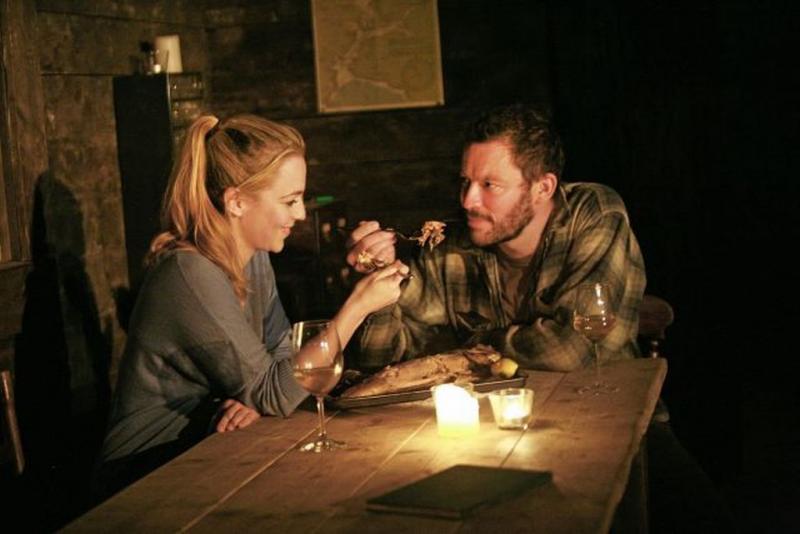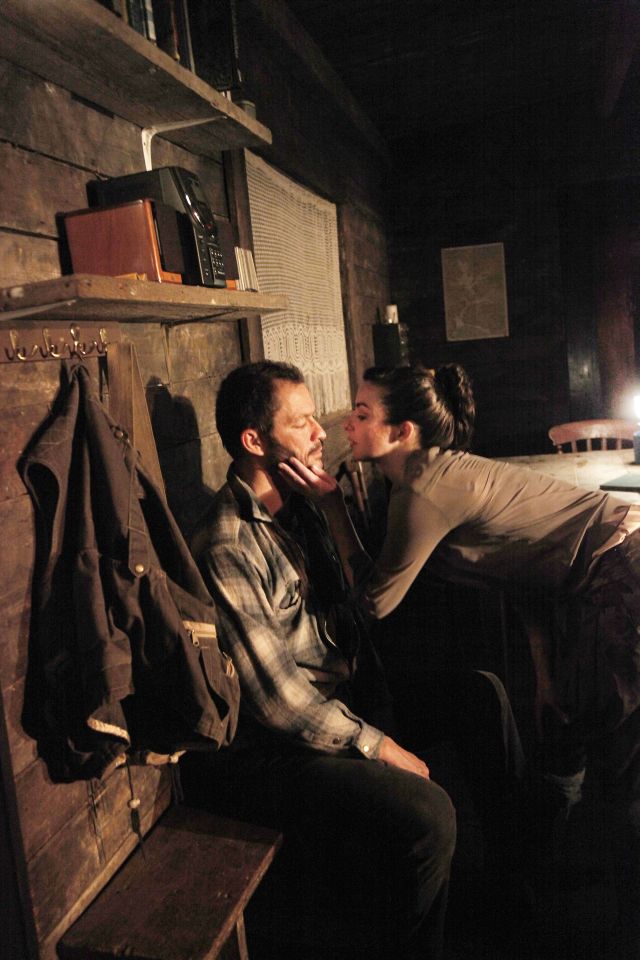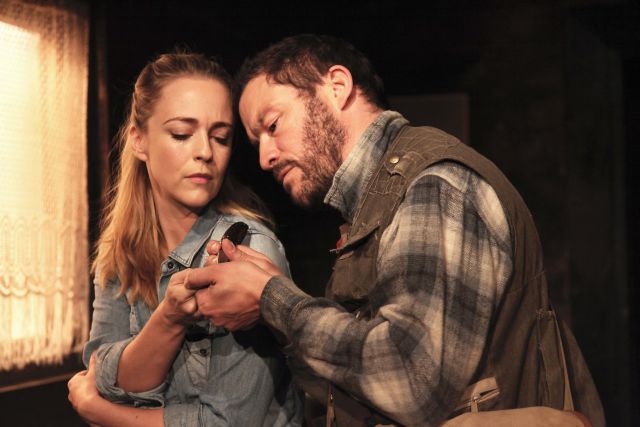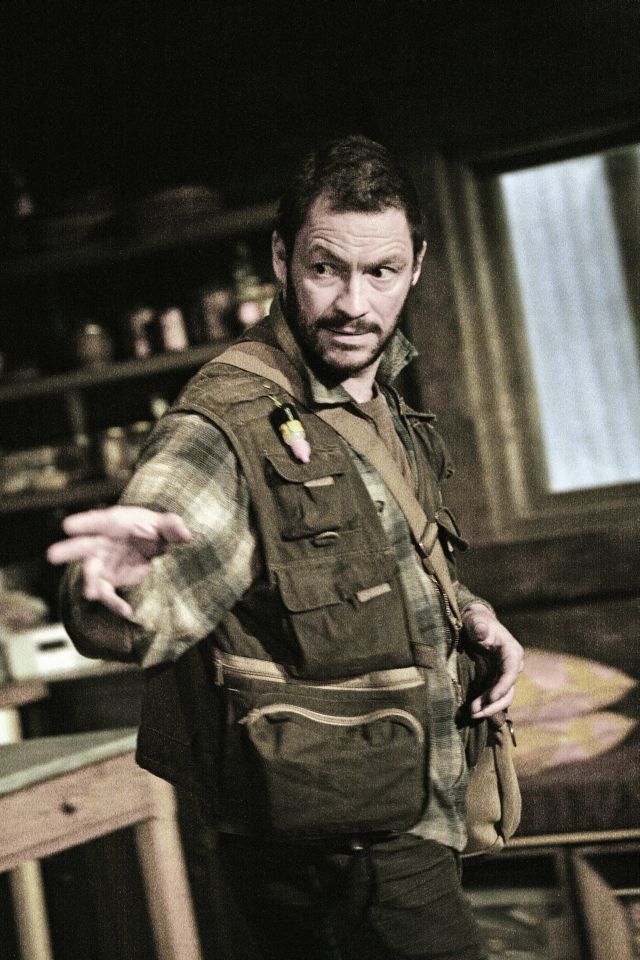The River, Royal Court Theatre | reviews, news & interviews
The River, Royal Court Theatre
The River, Royal Court Theatre
Jez Butterworth's latest is small in scale but poignantly and cunningly formed

Still waters run deep, but that truism barely hints at the quiet power of The River, the eagerly awaited new play from Jez Butterworth (writer) and Ian Rickson (director) whose collaboration yet again gives cause for cheer.
Don't let the fuss about how to get tickets - there is no advance purchase possible, only day seats - put you off the quest to do so. Here's a puzzle play, alluring and unsettling in turn, that puts one in mind of a roll call of writers (Harold Pinter among them) in different ways while marking Butterworth out anew as the most singular voice in town.
 The affinities to Pinter would be evident even without the Nobel laureate's widow, Lady Antonia Fraser, seated in the front row on opening night. At once sexy and sorrowful, its quotidian exchanges flecked with shards of poetry that give way to full-flown arias on such topics as the survival tactics of trout, this play's cunning begins with our first glimpse of a set that would seem to be the last word in naturalism. (The designer, as with Jerusalem, is Ultz, working here with a rural interior as against a roof-scraping Wiltshire mini-forest.)
The affinities to Pinter would be evident even without the Nobel laureate's widow, Lady Antonia Fraser, seated in the front row on opening night. At once sexy and sorrowful, its quotidian exchanges flecked with shards of poetry that give way to full-flown arias on such topics as the survival tactics of trout, this play's cunning begins with our first glimpse of a set that would seem to be the last word in naturalism. (The designer, as with Jerusalem, is Ultz, working here with a rural interior as against a roof-scraping Wiltshire mini-forest.)
At first, the wooden cabin before us seems the perfect bolt-hole in which to repair with a loved one, listening to music, reciting poetry, and heading down to the river - the nearest railway station a blessedly remote four miles away. But is what we're watching any more "real" (for which, read accurate or trustworthy) than our initial sense of a bearded Dominic West (pictured above with Laura Donnelly) playing an unnamed man who, on the surface anyway, would seem to be a poster boy for sensitivity, aesthetic awareness, and cooking skills, to boot? Look for sales of fresh fish to soar in SW1 during the run of a play that celebrates the culinary art to an extent not seen since Clare Higgins served up roast lamb some years back in Vincent In Brixton.
 And yet, the idyll is scarcely as bucolic as one might assume. The moonless night exalted early on suggests a gothic eeriness that intensifies when the man's new girlfriend (Miranda Raison, pictured below with West) is believed missing, necessitating a panicky call to the police. Only then does the cabin door open and we are greeted by a second woman (Donnelly, in a glistening performance) who may just possibly be the latest in an ongoing series to this cliff-top retreat of multiple female visitors over time. The play pulsates with sexual possibility and declarations of love that get revised, its apparent movement towards solitude and self-reproach negated by a spine-tingling twist not to be revealed here. Let's just say that the cycle of deceit hurtles ever onward, much like the rushing water heard in between scenes in Ian Dickinson's sinuous sound design.
And yet, the idyll is scarcely as bucolic as one might assume. The moonless night exalted early on suggests a gothic eeriness that intensifies when the man's new girlfriend (Miranda Raison, pictured below with West) is believed missing, necessitating a panicky call to the police. Only then does the cabin door open and we are greeted by a second woman (Donnelly, in a glistening performance) who may just possibly be the latest in an ongoing series to this cliff-top retreat of multiple female visitors over time. The play pulsates with sexual possibility and declarations of love that get revised, its apparent movement towards solitude and self-reproach negated by a spine-tingling twist not to be revealed here. Let's just say that the cycle of deceit hurtles ever onward, much like the rushing water heard in between scenes in Ian Dickinson's sinuous sound design.
What can't be cheered enough is the precision of a chamber production from Rickson that replaces the galvanic splendour and fury of Jerusalem with a series of highly charged moments equivalent to the "million lightning bolts" wished for early on by the bluntly spoken Raison. Eyes brimming over with an equal awareness of love and loss, West cuts a figure of unforced, casual masculinity as integral to this occasion as was Mark Rylance's outsized swagger to the posturing roustabout, Johnny Byron; it's a remarkable portrayal, not least for the way it finds something desolate in deception that ups the emotional stakes.
 And through the play flows writing alive to playfulness and nuance, whereby motifs of capture apply both to fly-fishing and within domestic relationships, and to a revelry in language that can speak of water as "gin-clear" and of a "chapel of cloud" without lapsing into the faux-poetics that could ensue. Nor can one ignore the gathering sense of a spectral landscape populated by ghosts and the living dead and where people cannot be erased, whether we wish them to be or not. (A recurring image is of a woman's face that has been scratched out.)
And through the play flows writing alive to playfulness and nuance, whereby motifs of capture apply both to fly-fishing and within domestic relationships, and to a revelry in language that can speak of water as "gin-clear" and of a "chapel of cloud" without lapsing into the faux-poetics that could ensue. Nor can one ignore the gathering sense of a spectral landscape populated by ghosts and the living dead and where people cannot be erased, whether we wish them to be or not. (A recurring image is of a woman's face that has been scratched out.)
To be sure, it may take a particular audience to respond to Butterworth's verbal patterns - the way, for instance, that Donnelly speaks of being "flipped over" in her love-making just as Raison cites the fish-like "flip-flopping" of her dead father. And the steady, often silent emphasis on ritual (accompanied for the most part by candlelight) will disappoint those who want more of the clamour with which Jerusalem imprinted itself upon an eager public. This is without doubt a darker play, and shorter (80 minutes), and more encoded, most importantly of all. But it's a testament to the achievement of all involved come the finish that one doesn't know whether to unlock the cryptogram yet further. Or to cry.
Add comment
The future of Arts Journalism
You can stop theartsdesk.com closing!
We urgently need financing to survive. Our fundraising drive has thus far raised £49,000 but we need to reach £100,000 or we will be forced to close. Please contribute here: https://gofund.me/c3f6033d
And if you can forward this information to anyone who might assist, we’d be grateful.

Subscribe to theartsdesk.com
Thank you for continuing to read our work on theartsdesk.com. For unlimited access to every article in its entirety, including our archive of more than 15,000 pieces, we're asking for £5 per month or £40 per year. We feel it's a very good deal, and hope you do too.
To take a subscription now simply click here.
And if you're looking for that extra gift for a friend or family member, why not treat them to a theartsdesk.com gift subscription?
more Theatre
 Ragdoll, Jermyn Street Theatre review - compelling and emotionally truthful
Katherine Moar returns with a Patty Hearst-inspired follow up to her debut hit Farm Hall
Ragdoll, Jermyn Street Theatre review - compelling and emotionally truthful
Katherine Moar returns with a Patty Hearst-inspired follow up to her debut hit Farm Hall
 Troilus and Cressida, Globe Theatre review - a 'problem play' with added problems
Raucous and carnivalesque, but also ugly and incomprehensible
Troilus and Cressida, Globe Theatre review - a 'problem play' with added problems
Raucous and carnivalesque, but also ugly and incomprehensible
 Clarkston, Trafalgar Theatre review - two lads on a road to nowhere
Netflix star, Joe Locke, is the selling point of a production that needs one
Clarkston, Trafalgar Theatre review - two lads on a road to nowhere
Netflix star, Joe Locke, is the selling point of a production that needs one
 Ghost Stories, Peacock Theatre review - spirited staging but short on scares
Impressive spectacle saves an ageing show in an unsuitable venue
Ghost Stories, Peacock Theatre review - spirited staging but short on scares
Impressive spectacle saves an ageing show in an unsuitable venue
 Hamlet, National Theatre review - turning tragedy to comedy is no joke
Hiran Abeyeskera’s childlike prince falls flat in a mixed production
Hamlet, National Theatre review - turning tragedy to comedy is no joke
Hiran Abeyeskera’s childlike prince falls flat in a mixed production
 Rohtko, Barbican review - postmodern meditation on fake and authentic art is less than the sum of its parts
Łukasz Twarkowski's production dazzles without illuminating
Rohtko, Barbican review - postmodern meditation on fake and authentic art is less than the sum of its parts
Łukasz Twarkowski's production dazzles without illuminating
 Lee, Park Theatre review - Lee Krasner looks back on her life as an artist
Informative and interesting, the play's format limits its potential
Lee, Park Theatre review - Lee Krasner looks back on her life as an artist
Informative and interesting, the play's format limits its potential
 Measure for Measure, RSC, Stratford review - 'problem play' has no problem with relevance
Shakespeare, in this adaptation, is at his most perceptive
Measure for Measure, RSC, Stratford review - 'problem play' has no problem with relevance
Shakespeare, in this adaptation, is at his most perceptive
 The Importance of Being Earnest, Noël Coward Theatre review - dazzling and delightful queer fest
West End transfer of National Theatre hit stars Stephen Fry and Olly Alexander
The Importance of Being Earnest, Noël Coward Theatre review - dazzling and delightful queer fest
West End transfer of National Theatre hit stars Stephen Fry and Olly Alexander
 Get Down Tonight, Charing Cross Theatre review - glitz and hits from the 70s
If you love the songs of KC and the Sunshine Band, Please Do Go!
Get Down Tonight, Charing Cross Theatre review - glitz and hits from the 70s
If you love the songs of KC and the Sunshine Band, Please Do Go!
 Punch, Apollo Theatre review - powerful play about the strength of redemption
James Graham's play transfixes the audience at every stage
Punch, Apollo Theatre review - powerful play about the strength of redemption
James Graham's play transfixes the audience at every stage
 The Billionaire Inside Your Head, Hampstead Theatre review - a map of a man with OCD
Will Lord's promising debut burdens a fine cast with too much dialogue
The Billionaire Inside Your Head, Hampstead Theatre review - a map of a man with OCD
Will Lord's promising debut burdens a fine cast with too much dialogue

Comments
Agree overall, a wonderful